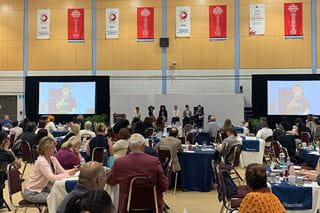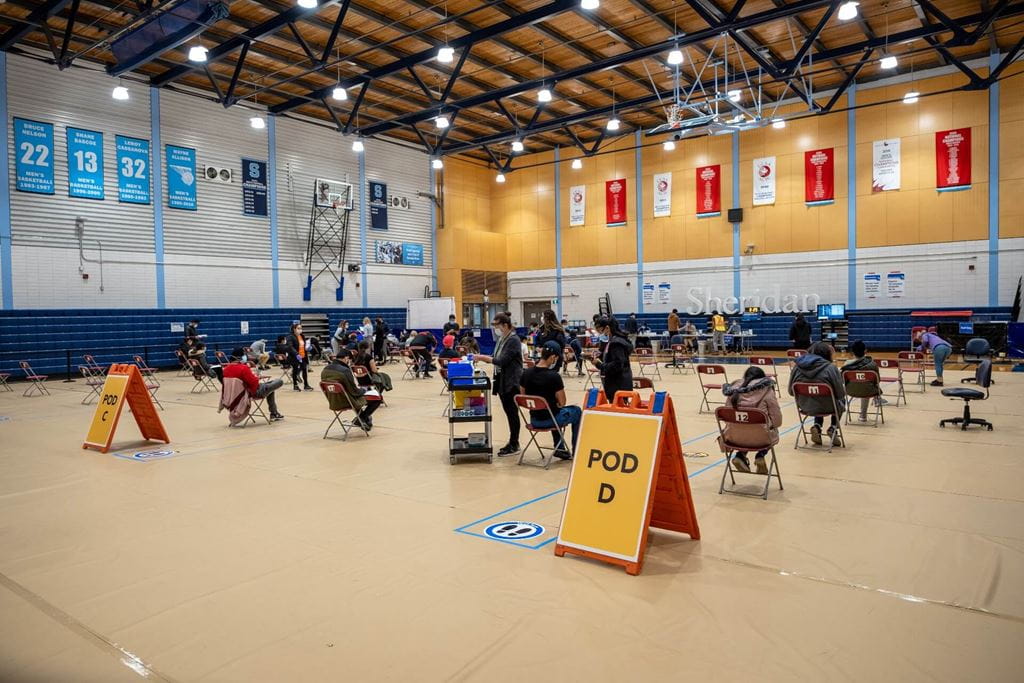
A true community effort: Sheridan vaccination clinic ensures no one is left behind
Carly Agro expected her emotions to run high when she finally received her COVID-19 vaccination.
But the 2009 journalism alumna didn’t anticipate that the kindness she saw at the clinic – the warmth from the nurses, volunteers, and fellow eager clinic-goers – would be just as impactful as the few seconds it took to get the jab.
Agro, who serves as a Sportsnet host and reporter, was one of the over 9,400 individuals to receive a vaccination at Sheridan’s CommUNITY clinic – a pop-up vaccine clinic running at Sheridan’s Davis Campus in Brampton.
“There was just such overwhelming kindness and consideration from everyone on site,” says Agro. “The woman who greeted me at the entrance with a smile, the Sheridan volunteer who checked me in – even the security guards moving everyone along — they made it all such a positive experience. While I was standing in line, I saw the people ahead of me encourage a man using crutches to go in front of them. There was so much warmth and generosity from total strangers.”
As if I needed a reason to love my alma-mater MORE! @sheridancollege @sheridanalumni
— carly agro (@SNCarlyAgro) June 10, 2021
Thank you to the wonderful humans making this day possible and to our #HealthcareHeroes who continue to fight this fight everyday. #IgotmyshotatSheridan #vaccinated pic.twitter.com/XoXRGthzzV
Agro also noticed volunteer translators guiding individuals who looked a bit nervous or confused about the vaccination process. “Watching the translators on site and seeing the signage on campus in different languages (such as Punjabi and Hindi) was a reminder for me that the vaccination process isn’t easy for everyone,” she says. “Some people encounter barriers that can make it an intimidating experience.”
The details Agro noticed were by design. A true community initiative, fueled by a collaboration between Sheridan, the Region of Peel, Indus Community Services, Punjabi Community Health Services the Latin-American COVID-19 Task Force and the Government of Ontario, the CommUNITY clinic aimed to reach under-vaccinated communities in the diverse neighbourhoods surrounding the Davis Campus in Brampton. This area is home to many essential workers, uninsured and undocumented individuals, vulnerable and marginalized persons, and international students.
Serving the Peel community
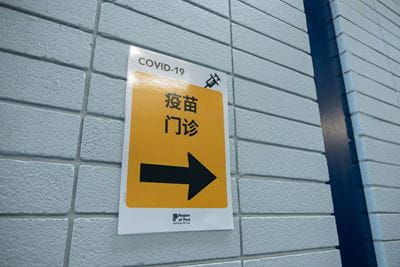
Peel has been severely impacted by COVID-19, in part due to the active manufacturing, logistics and transportation industries in the area. The essential nature of these roles and businesses means they continued to operate through the provincial closures and shutdowns of the past year. What’s more, many of the workers in these industries are from racialized or new immigrant communities, who are less likely to miss work if they feel unwell. At one point in early May, Peel was facing a positivity rate of 18.5 per cent — nearly three times higher than Ontario as a whole.
“[Peel Region] had reached out to us early on to explore options for clinics, so we were ready and poised to lean in and work with the Region and community partners to support opening a clinic at Sheridan’s Davis Campus,” says Karen LeMoine, Director of Community Engagement and Stakeholder Relations at Sheridan, adding that many Sheridan students live off campus or are working part-time in the affected areas. “We wanted to do our part to help with Canada's collective vaccination effort, especially in this area of the Region that had high incidence rates and lower vaccine uptake at the time. With the Region of Peel and Ministry of Health’s support, we were given the flexibility to figure how to promote and set up a clinic that would best serve the population in our area.”
“We knew that our community partners are skilled in targeted outreach and connecting within many communities at a grassroots level, in addition to our ability as Sheridan to reach out through our communication channels to reach our student population.”
— Karen LeMoine, Director of Community Engagement and Stakeholder Relations
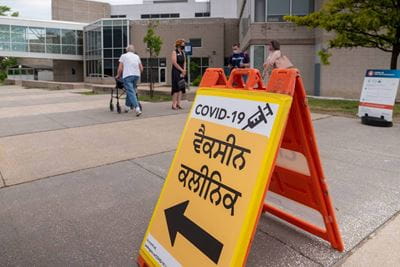
For Sheridan’s CommUNITY clinic, this meant reaching out to these hotspot communities directly using culturally specific messaging, with support from Indus Community Services, Punjabi Health Services, and the Latin American COVID-19 Taskforce. It also meant recognizing that not all individuals in these areas are active social media or internet users and hadn’t been as openly exposed to Ontario’s mass vaccination campaign messaging.
“We knew that our community partners are skilled in targeted outreach and connecting within many communities at a grassroots level, in addition to our ability as Sheridan to reach out through our communication channels to reach our student population,” says LeMoine.
The clinic’s community partners quickly mobilized a local, culturally specific communications effort, reaching community members through numerous channels. Flyers were printed in four different languages, including Hindi, Punjabi and Spanish, and distributed across the city. Volunteers knocked on doors, went to local plazas, gas stations, places of worship and neighbourhoods to educate people on the vaccines and help them book appointments at the clinic.
Anmoal Gill, Program Coordinator with Punjabi Community Health Services (PCHS), says they were able to reach out to their robust client list to inform them of the vaccination list – individuals that they had been supporting throughout the pandemic, with everything from booking testing appointments to helping with isolation questions.
“A lot of the work we had been doing for so long was trying to guide our clients through hardships caused by the COVID-19 pandemic, and it had an inherently dark tone to it. We were helping families and individuals when they were very confused and very lost,” explains Gill. “So to be able to come back to the community and offer them an opportunity to get the vaccine - it was great to help close the loop. We were being contacted by some of the same community members we worked with in the past because of the trust we had built with the community.”
PCHS used some unique avenues to get the word out. A local Indian restaurant was able to inform hundreds of international students about the clinic by including the flyers in its tiffin service – a traditional Indian food delivery service that sees lunches delivered to customers in stainless-steel containers, known as tiffins. PCHS was also able to reach international students through popular WhatsApp and Instagram groups, and by asking clients and international students with strong social followings to help share messaging.
Sheridan community steps up
Sheridan was able to tap into one of its greatest strengths: its people. A call for employee volunteers resulted in over 100 Sheridan employees across all departments and faculties donating their time, providing non-clinic support onsite with tasks such as wayfinding and health screen assessments.
“Sheridan has been a proud member of Brampton for over 50 years, and knowing the impact COVID-19 has had on our local community, it’s been very important for us to be an innovator during this time and step up where we can,” said Michael O’Leary, Dean of Sheridan’s Faculty of Applied Health and Communities Studies, based out of Davis. “Over the past year, we’ve supported the manufacturing of PPE equipment for front-line workers, and now we’re proud to step up to the plate to provide vaccines. Providing access in any way we can to both education and services is a vital aspect of what we do here at Sheridan.”
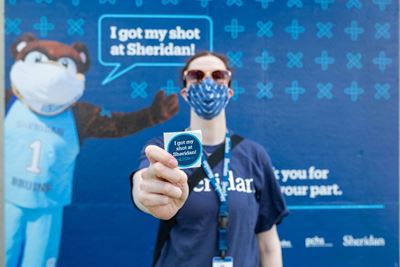 Sheridan’s pandemic response has continued to reinforce the principles in the college’s strategic plan, emboldened with an ethos of kindness and compassion. While student and graduate success are key drivers of this plan, it also focuses on the communities Sheridan serves.
Sheridan’s pandemic response has continued to reinforce the principles in the college’s strategic plan, emboldened with an ethos of kindness and compassion. While student and graduate success are key drivers of this plan, it also focuses on the communities Sheridan serves.
Patrick Sharp, building operations technician at Sheridan and a volunteer at the clinic, recalls learning that a fellow Sheridan clinic volunteer was simultaneously working at a local hospital to offset the heavy workloads that hospital staff were seeing during the pandemic. “It’s phenomenal to see how Sheridan staff will go the extra step to help where needed – it made me proud to be part of a such great community.”
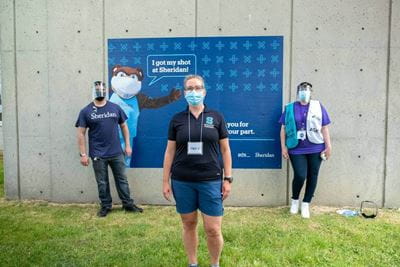 Tammy Datars, Senior Manager of Student Healthcare Services, echoed these sentiments, noting that giving back makes her and her team feel much closer to Sheridan’s campus communities. “We are reinforcing our commitment to our goals of radical engagement and healthy and creative communities,” adds Amanda Sookdeo, Academic Portfolio Administrator.
Tammy Datars, Senior Manager of Student Healthcare Services, echoed these sentiments, noting that giving back makes her and her team feel much closer to Sheridan’s campus communities. “We are reinforcing our commitment to our goals of radical engagement and healthy and creative communities,” adds Amanda Sookdeo, Academic Portfolio Administrator.
“From the minute you enter the clinic, the staff is warm, friendly, and you can see the effort they put forth to make the whole experience wonderful.”
— Clinic Physician
The efforts of Sheridan volunteers and its partners earned accolades from the community, as well as the health professionals on site. One physician, who had worked at several clinics in Peel and Vaughan, attested Sheridan’s operations were among the best she’d seen. “From the minute you enter the clinic, the staff is warm, friendly, and you can see the effort they put forth to make the whole experience wonderful.”
Making a change
Beyond the welcoming atmosphere, Sheridan’s CommUNITY clinic resulted in demonstrable change for the Peel community Over the first instalment of the clinic, which ran for 17 days until June 13, data from the Institute for Clinical Evaluative Sciences showed that L6Y – the targeted postal code — had the highest percentage vaccine uptake in the entire Region of Peel. The percentage of 18–29-year-olds in that area who have received their first dose was hovering around 100 per cent on the last day of the clinic’s initial run. This group saw a significant increase in uptake over the duration of the clinic (about 17 per cent).
According to Dr. Lawrence Loh, Medical Officer of Health, Region of Peel Public Health, the Sheridan CommUNITY clinic played an important part in achieving these stats. He highlighted the efforts of Indus Community Services, Punjabi Community Health Services, the Latin-American COVID-10 Task Force and Sheridan College to ensure that marginalized and vulnerable groups in our community don’t get left behind.
The overwhelming success of the clinic enabled organizers to extend its operations several times.
For Agro, the clinic bolstered the pride she felt for her alma mater. “I’ve always been proud to be a Sheridan alumna, but this put an exclamation mark on it for me,” she says. “It’s so important for an institution such as Sheridan to have a connection to their community, and the Davis campus is central to Brampton. If there was ever at time to get involved, this is certainly it.”
Media Contact
For media inquiries, contact Sheridan’s Communications and Public Relations team.




